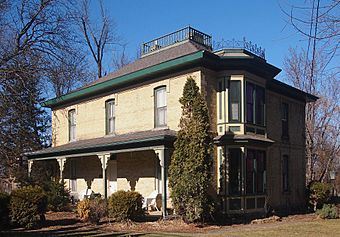Francis Arnold House facts for kids
Quick facts for kids |
|
|
Francis Arnold House
|
|

The Francis Arnold House viewed from the south
|
|
| Location | 32268 County Road 1, LeSauk Township, Minnesota |
|---|---|
| Nearest city | St. Cloud, Minnesota |
| Area | 1.4 acres (0.57 ha) |
| Built | 1884 |
| Architect | Allan E. Hussey |
| Architectural style | Italianate |
| NRHP reference No. | 94001409 |
| Added to NRHP | December 1, 1994 |
The Francis Arnold House is a special old house located in LeSauk Township, Minnesota. It was built way back in 1884. This house is important because it belonged to the person who owned and ran a gristmill nearby.
Contents
A Home with History
The Francis Arnold House is a historic building. This means it is an old structure that is important because of its past. It helps us understand what life was like long ago. The house was built for Francis Arnold. He was the owner of a gristmill.
What is a Gristmill?
A gristmill is a type of factory. It uses water power to grind grain. Farmers would bring their corn or wheat to the mill. The mill would then grind it into flour or meal. This was a very important business in the past. People needed flour to make bread and other foods.
The Mill's Location
The gristmill owned by Francis Arnold was very close to his house. It stood on the bank of the Sauk River. This river flows into the much larger Mississippi River. The spot where two rivers meet is called a confluence. The mill used the flowing water of the Sauk River to power its grinding stones.
Why is it Important?
The Francis Arnold House is listed on the National Register of Historic Places. This is a special list of buildings, sites, and objects that are important to American history. The house was added to this list in 1994.
A Symbol of Industry
The house is important because it shows us about industry in the past. Specifically, it represents the many family-owned mills. These mills used water power to operate. They were very common in rural areas like Stearns County a long time ago. The Arnold House helps us remember this important part of history. It shows how people lived and worked in the late 1800s.



